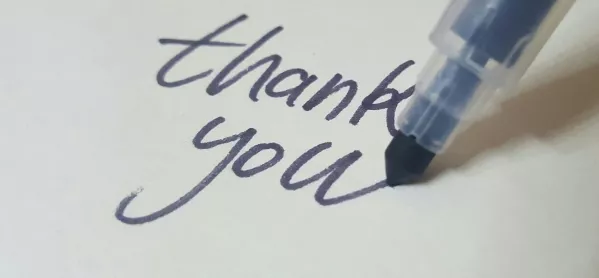Recently, there’s been a lot in the press about the responsibilities of schools.
These responsibilities come, apparently, in many forms: from instilling an understanding of a healthy diet, to looking after animals, and even the eradication of the horrors of knife crime.
In schools, we’re being asked to provide support way beyond the academic curriculum. The pressures are immense and, if the surveys are accurate, we are literally haemorrhaging teachers from the profession. That’s before we even consider the massive shortfall in those prepared to enter the profession.
With the woes of society on our shoulders, “thanks” is a word not often levelled at the profession from the outside world. And sadly, “thanks” is not a word we hear from inside the profession either.
We’re running the risk of missing out on something really valuable if we don’t recognise the importance of this simple word.
I’m lucky enough to have a number of students who regularly thank me as they depart the lesson. This is a natural routine for them, so much so that on occasions they have thanked me following a particularly difficult exam question. When those students leave my room, routine or not, it unfailingly brings a smile to my face. I feel ready to tackle whatever the next class or next email may bring and, for a moment at least, I revel in that feeling of appreciation and gratitude.
Saying thanks comes very naturally to me, which means my students frequently come across this word in my classroom. Equally, those who work alongside me will have heard me say this on numerous occasions. I am genuinely grateful for what individuals bring to my day. When I observe a lesson, I thank that person for the opportunity I’ve had to share in their practice and, more often than not, I thank them because I have learnt something from the experience.
However, this simple word does not always fall from the lips so easily. And it can feel that in the case of some leaders, it’s disappeared from their vocabulary all together.
As with everything in our practice, saying thanks should be practised and refined, especially if you are a school leader. Not everyone is lucky enough to have students who give thanks as they leave the lesson, riding on a tide of newly acquired knowledge and inspiration. And very few queue up to offer thanks to the profession as a whole or even to the individual teacher who woke up at 4am sweating at the prospect of the next set of exams.
Leaders have a responsibility to fill this gap, ensuring that their staff are truly thanked for what they do.
I don’t mean that disingenuous whole staff thanks, popped on the weekly calendar, or in generic email. This kind of token gesture can be spotted from a mile off. It needs to be much more personal and genuine.
We all have a reason to give thanks to each other and it’s important to acknowledge that. It costs nothing, brings a smile to the recipient’s face and builds an environment where people feel genuinely valued.
And when people feel valued, there is no end to what can be achieved, regardless of those outside pressures. Thanks is a perfect place to begin building this. Cicero said: “Gratitude is not only the greatest of virtues, but the parent of all others.” If we offer thanks we can create something very precious in our schools.
The writer is a director of improvement at an academy in England




